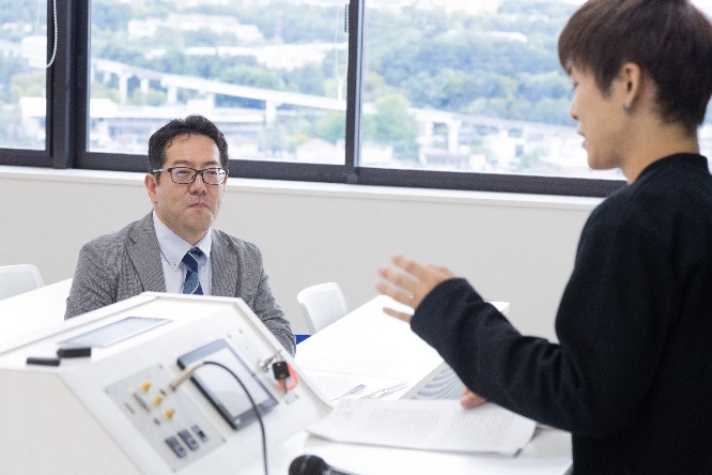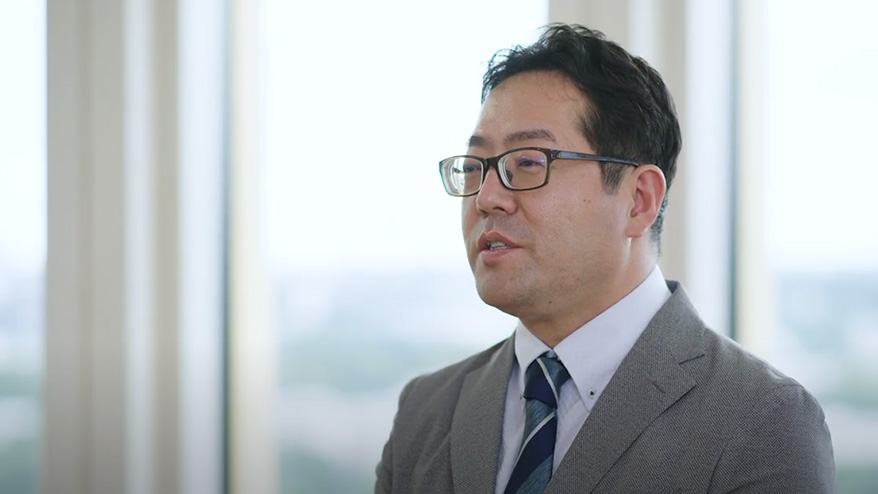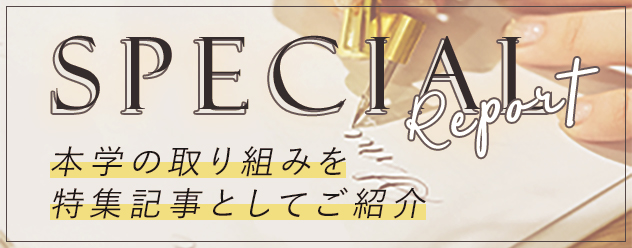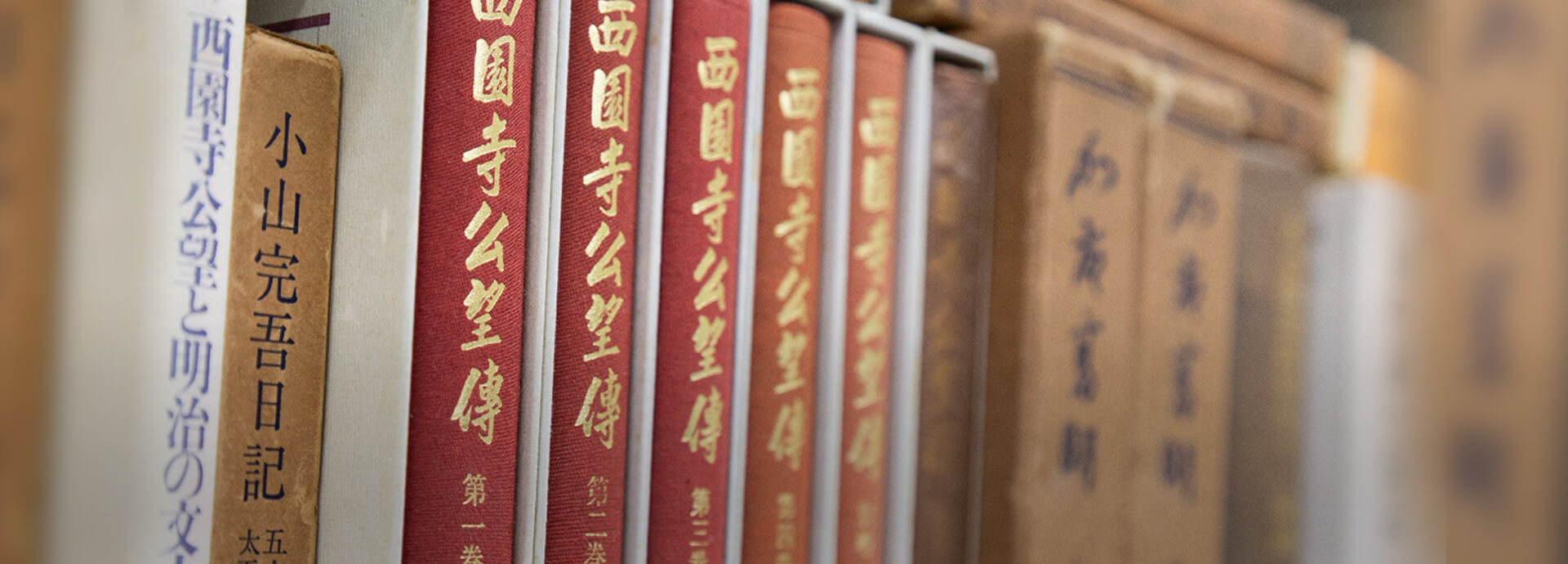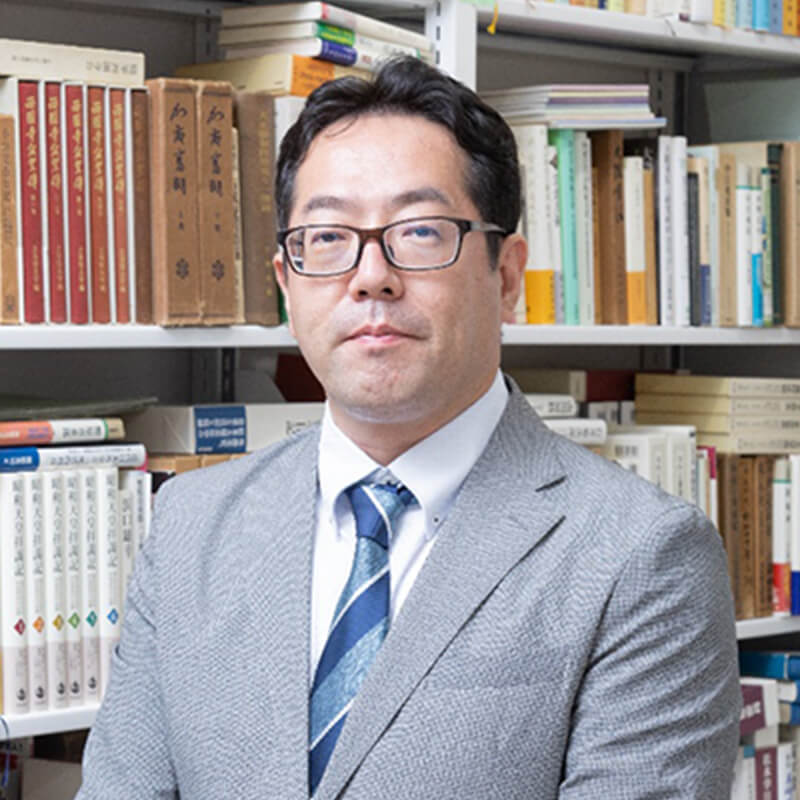Professor Toshiki Koyama, of the Faculty of Liberal Arts Department of History at Teikyo University,
focuses his research on modern Japanese politics from the Meiji period to the pre-war period. He aims to clarify the utilization of "confidential funds," previously considered a black box, in order to decipher the story behind this turbulent era.
Additionally, he seeks to elucidate the actual circumstances surrounding the May 15 Incident and the movements of the media and public opinion reporting on the trial.
His work also sheds light on the societal transition into an era of war.
Among the myriad issues that have arisen in modern Japan,
Professor Koyama's research concentrates
on "politics and violence" as well as "media."
The black box of modern Japanese politics
Exploring the use of “confidential funds”
Modern Japan, from the Meiji Restoration to the Taisho era and before the war, was a time of continuous major political change. With the establishment of the National Diet in 1890, the framework of a constitutional state was put in place, and the government rapidly moved forward with the establishment of a cabinet system, the promulgation of the Constitution of Great Japan, the beginning of parliamentary politics, and the creation of a political party cabinet. After the outbreak of the Manchurian Incident in 1931 and the May 15 Incident the following year, the political party cabinet came to an end.
Professor Toshiki Koyama of Faculty of Liberal Arts Department of History Letters, whose research theme is parliamentary politics and party politics in modern Japan over the past several decades, does not simply follow the flow of history, but rather examines how politics changed as a result of who acted and how. I have been trying to capture the aspect of human activity. Professor Koyama focused on ``confidential funds'' as a historical source that could provide clues. "Confidential funds" are secret public funds that can be used for confidential purposes without going through an audit. After the war, the name was changed to ``reward expenses'' by GHQ directive, and it still exists today.
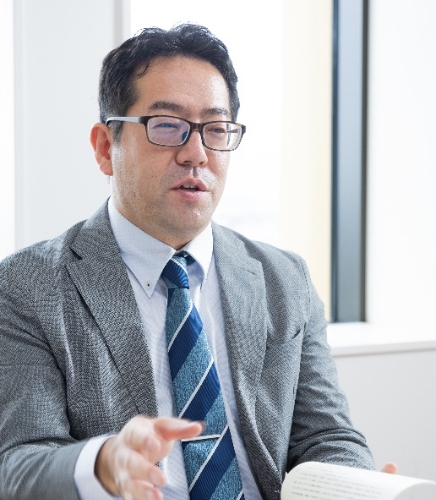
The roots of this can be traced back to the levy imposed by the Edo shogunate when it licensed red-light districts. In the Meiji period, the police under the Ministry of Home Affairs inherited this system and established an expense item called police detective expenses (later an expense item called police confidential expenses). This is where the history of confidential funds begins.
Furthermore, around the time the Imperial Diet was established, a confidential expenditure system was established in the central government, and confidential expenditures were recorded in each ministry such as the Cabinet, Ministry of Home Affairs (headquarters and regional offices), Ministry of Foreign Affairs, Ministry of War, Ministry of the Navy, and Ministry of Justice. ing. Although it was based on the national budget framework, each ministry and agency was exceptionally allowed to manage it independently, without being questioned by Congress or other government agencies about how it was spent. And since confidential historical materials are usually disposed of, it remains unclear how confidential funds were used throughout history. However, Professor Koyama learns that there are historical materials that can confirm the contents of this black box.
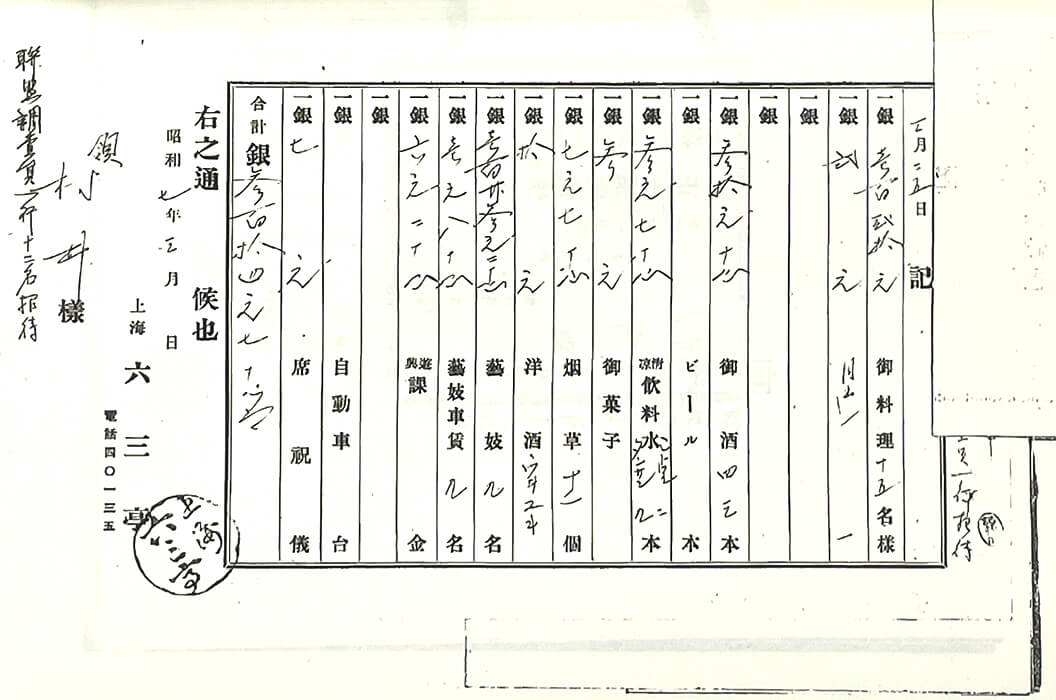
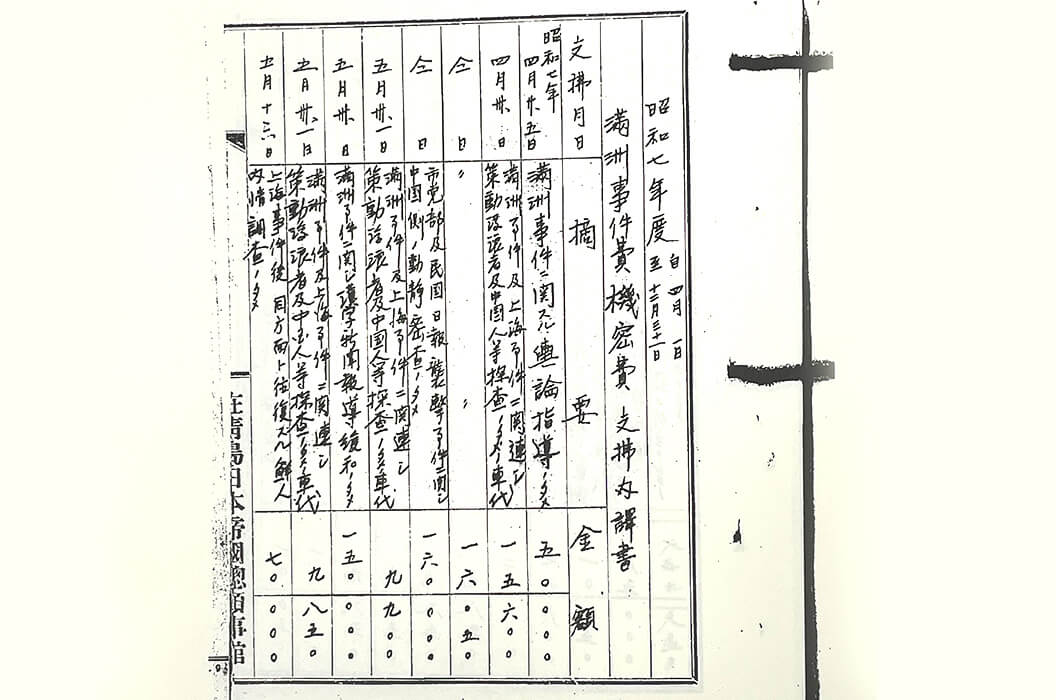
Record of the Litton investigation team being entertained by geishas at the Shanghai Rokusan Residence (1932, Consulate General of Shanghai) (left), and a breakdown of payments (1932, Consulate General of Qingdao), where intelligence activities and media countermeasures are prominent (right)
Source: Ministry of Foreign Affairs Diplomatic Archives
Record of the Litton investigation team being entertained by geishas at Rokusan Residence in Shanghai (1932, Consulate General of Shanghai) (top), and payment breakdown with prominent details of espionage activities and media measures (Consulate General of Qingdao, 1932) (bottom)
Source: Ministry of Foreign Affairs Diplomatic Archives
From historical materials handed down in the Saionji family
You can see behind the scenes of politics
``Many of the documents related to classified funds were the first to be incinerated after the war was defeated.On the other hand, it seems that some people left them behind because they thought they must be important because they were confidential, so historical documents related to secret funds from before the war were destroyed. I started to realize that there were still pieces of information left in various places. I researched the fragmentary historical materials and pieced them together to create a story about secret spending that was happening behind the scenes of Japanese politics before Japan lost the war."
Some of the historical materials that remain regarding confidential funds include official documents owned by public institutions, while others were left in the homes of the prime minister and secretaries and have been passed down to the present day. What had a particularly big impact on Professor Koyama's research was the historical materials of secret cabinet funds (currently (Possessed by the Ritsumeikan Historical Materials Center), it is thought to be the only original historical document related to secret cabinet funds from the pre-war period.
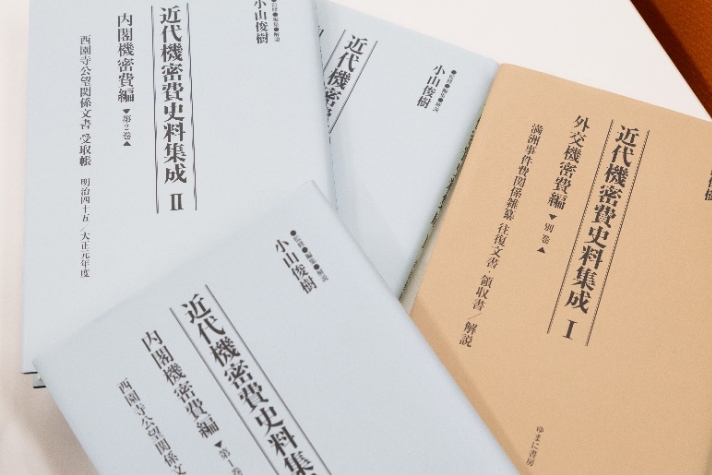
In addition to this, there are a wide variety of other fragmentary confidential historical materials that remain.
At the same time, there are historical documents about confidential cabinet funds left behind by Hirobumi Ito, but they were destroyed in the war and only the transcribed copies remain. On the other hand, the secret cabinet funds historical materials that have been handed down to the Saionji family include original documents such as receipts and bank account documents that contain various information regarding the use of confidential funds. This is a very important point.
For example, receipts show that during the second Saionji Cabinet, large sums of money were paid to newspapers, news agencies, and other media-related parties as recipients of confidential funds. Kinmochi Saionji, who was also the president of the Rikken Seiyukai, provided financial support to media-related companies (newspapers and news agencies) immediately after the Seiyukai cabinet was formed, and also provided financial support to individual newspaper reporters with whom he had close friendships when they were transferred. As a farewell gift, we are investing from confidential funds. The media that received funding participated in the government's information activities as ``Seiyukai-affiliated journalists,'' such as uncovering scandals of rival political parties.
Confidential documents from 1902 reveal that election expenses were insufficient from the Cabinet's confidential funds alone, so funds were brought in from the Ministry of Foreign Affairs' confidential funds. The words ``Senmanen'' and ``Accepted by the Ministry of Foreign Affairs'' are clearly written on the document.
"Historical materials of the Saionji family include details such as expenditures immediately before handing over to the next government and year-end allowances for Cabinet and Ministry of Finance staff. By analyzing the contents of these materials, we will be able to understand the modern political system, accounting, etc. I hope to present a perspective that will provide hints for exploring issues with the audit system."
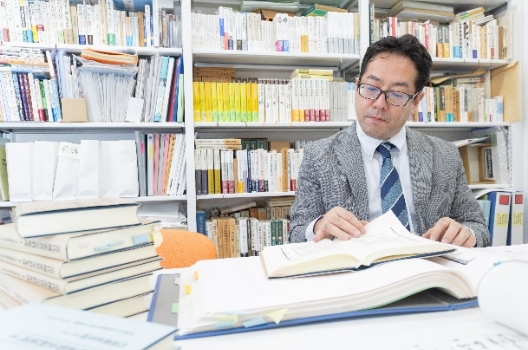
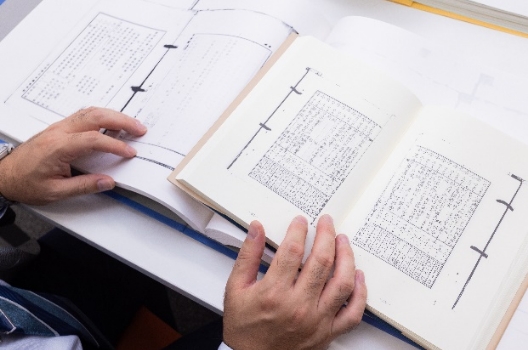
Behind the May 15 Incident
Focusing on the issue of “politics and violence”
The May 15 Incident that occurred in 1932 is an essential event when discussing modern Japanese politics. This incident, in which Prime Minister Takeshi Inukai was assassinated by a naval officer, has mostly been talked about from a political perspective, but Professor Koyama says that it changes depending on the atmosphere of the time, the public's reaction, and the way the media reports it. He carefully researched public opinion and other matters.
A new book for the general public that summarizes these works won the 42nd Suntory Academic Award (Ideology and History Category).
The May 15 Incident did not initially attract much attention, but when the culprits' ideology and background were revealed during the subsequent trial, the public's perception of the incident changed completely. The masses praised them, calling them ``Ako Ronin'' and ``spokespeople for the masses,'' believing that this was a coup d'état carried out by young elites with a promising future who gave up their career paths to reform the world. In response to such public opinion, the atmosphere in Japan changed drastically, paving the way for war.
``The premise behind the incident was that there was a sense of distrust that economic disparity had widened due to the selfish behavior of politicians and the upper echelons of society, and the public was captivated by the heroic story of an uprising by the elites. On the other hand, there are arguments that violence is not acceptable, and society is divided.There are limits to politics, but politics and violence have come to the point of endorsing violence. ``This issue is also one of the points that I focused on in the May 15 Incident.''
Repeated dialogue with the past
Looking at modern times from a historian's perspective
When I asked Professor Koyama what he valued most when researching modern Japanese history, he answered, "Knowing people." Whether it's the confidential expenses issue or the May 15 Incident, we have focused not only on the social system and the facts that happened there, but on the people who create that system and atmosphere. In this way, we will find clues that connect the past to the present.
For example, the fundamental issues of the accounting audit system revealed through research on confidential funds can provide useful knowledge in creating accounting audit systems for administrative organizations and companies. Furthermore, the dissemination of false information, which was common in prewar parliamentary politics, is similar to modern fake news. As we live in an era where it is becoming increasingly difficult to discern what is correct information, it is important to be aware of the ways in which lies are perpetuated within the social system.
``History is ``dialogue with the past.'' Even though we live in a different world, the present, we continue to have dialogue with the past world that is the subject of our research, and as a result, we discover things that we cannot imagine today. I find it interesting to receive unexpected responses.I continue my research in the hope that the knowledge gained through these conversations can be of use to us today.People from different times and backgrounds. By knowing the history of the past, we can objectively view the values we have here today as unique to the modern era.I believe that this is where the significance and depth of history lies.''
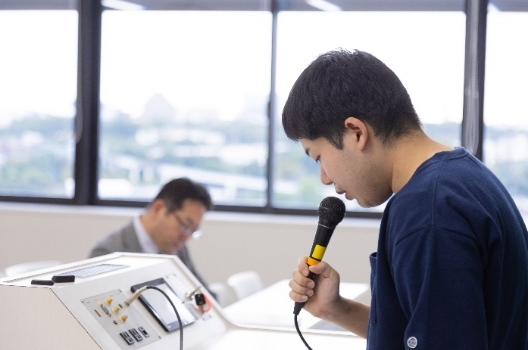
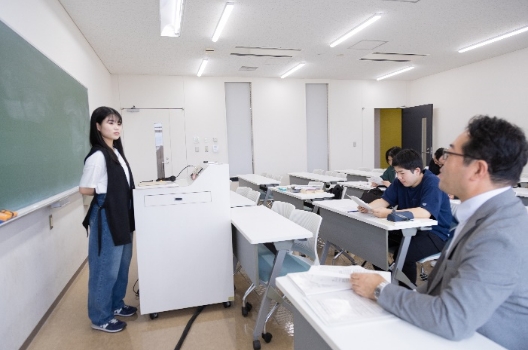
In the future, Professor Koyama says he would like to take a closer look at modern Japanese history over a longer span, including politics and society during the post-war occupation period. In the research I am currently working on, I am trying to find out why politician Takao Saito was able to continue to advocate for liberalism despite being expelled for making anti-military speeches during the war. It will probably be a long job, but I'm sure that at the end of the journey, I will be able to see what ``freedom'' and ``speech'' should be.
